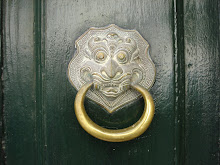After 70 years of empirical-evidence-gathering (by others than me), all facts point to the same inevitable conclusion: the curse of Tut Ankh Amon is upon us.
Remember the first tumultuous weeks of the Egyptian Uprising, when the baltageya and other hired thugs took to the streets of Egyptian cities to create general chaos and disorder to blacken the name of the protesters?
Not only were somewhere around 800 Egyptians killed during this period, the NDP headquarters burned down (without a single fire fighter showing up at the scene), stores and houses looted, horses and camels unleashed in the middle of peacefully protesting crowds, but a number of ancient artifacts were also stolen from the Egyptian Museum close to Tahrir Square. In spite of the human shield created by young protesters around the pink Museum.
Among the stolen artifacts, was an ancient brass trumpet found by Howard Carter in Tut Ankh Amon's tomb in 1922. And here begins the magic:
In 1939, seventeen years after it was found, the trumpet was played for (as far as I understand) the first time in 3000 years.
Imagine what such an old instrument can conjure up.
It was James Tappern who, I assume rather innocently, sounded the trumpet as 150 million people from all over the world tuned in to listen to the BBC radio broadcast directly from Cairo. Moments before he was to begin his mini concert, the electricity went (like you would expect if you tamper with a pharaoh's belongings).
And? Shortly after, the Second World War broke out.
Years and years later, the trumpet was once again sounded by a, for me, unknown person. Not long after, the Gulf War broke out.
A coincidence?
One week before the Egyptian Revolution started this year, a member of the staff at the Museum reportedly lifted up and tooted the instrument, one would suppose, rather innocently. Days later, the Egyptian Revolution began.
See what I'm saying?
How can one not interpret these three unrelated events as evidence that Tut Ankh Amon's tomb was indeed cursed and that the trumpet possesses a mysterious power to summon wars and revolutions?
According to the BBC, where I learned about this thrilling story to begin with, the brass trumpet has been returned to the Museum. It was found in an anonymous bag in the Cairo Metro a while back. As if by magic.
I never expected a cursed trumpet to allow itself to remain in the hands of the baltageya for very long anyway. But I do wonder what will happen the next time an unsuspecting person picks up and blows the instrument.
Should we beware?

Remember the first tumultuous weeks of the Egyptian Uprising, when the baltageya and other hired thugs took to the streets of Egyptian cities to create general chaos and disorder to blacken the name of the protesters?
Not only were somewhere around 800 Egyptians killed during this period, the NDP headquarters burned down (without a single fire fighter showing up at the scene), stores and houses looted, horses and camels unleashed in the middle of peacefully protesting crowds, but a number of ancient artifacts were also stolen from the Egyptian Museum close to Tahrir Square. In spite of the human shield created by young protesters around the pink Museum.
Among the stolen artifacts, was an ancient brass trumpet found by Howard Carter in Tut Ankh Amon's tomb in 1922. And here begins the magic:
In 1939, seventeen years after it was found, the trumpet was played for (as far as I understand) the first time in 3000 years.
Imagine what such an old instrument can conjure up.
It was James Tappern who, I assume rather innocently, sounded the trumpet as 150 million people from all over the world tuned in to listen to the BBC radio broadcast directly from Cairo. Moments before he was to begin his mini concert, the electricity went (like you would expect if you tamper with a pharaoh's belongings).
And? Shortly after, the Second World War broke out.
Years and years later, the trumpet was once again sounded by a, for me, unknown person. Not long after, the Gulf War broke out.
A coincidence?
One week before the Egyptian Revolution started this year, a member of the staff at the Museum reportedly lifted up and tooted the instrument, one would suppose, rather innocently. Days later, the Egyptian Revolution began.
See what I'm saying?
How can one not interpret these three unrelated events as evidence that Tut Ankh Amon's tomb was indeed cursed and that the trumpet possesses a mysterious power to summon wars and revolutions?
According to the BBC, where I learned about this thrilling story to begin with, the brass trumpet has been returned to the Museum. It was found in an anonymous bag in the Cairo Metro a while back. As if by magic.
I never expected a cursed trumpet to allow itself to remain in the hands of the baltageya for very long anyway. But I do wonder what will happen the next time an unsuspecting person picks up and blows the instrument.
Should we beware?










